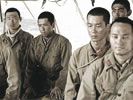Eye For Film >> Movies >> Letters From Iwo Jima (2006) Film Review
Letters From Iwo Jima chronicles a WWII battle on a small island off Japan. The Letters of the title relate to letters home, written and buried by the Japanese soldiers before they died.
The film is told exclusively from the viewpoint of greatly outnumbered Japanese forces and is a companion piece to Clint Eastwood's Flags Of Our Fathers, which told a different story from the US point of view.

Cinema has a long history of war films and it is perhaps important to look at what makes this one different. It was shot back-to-back with Flags from the same location and details the same battle. Although in Japanese, with Japanese actors, it is a recognisably American film, carrying the usual psychological themes, with which we can identify - courage, comradeship, and so on. The familiar iconography of an island that is defended at all costs is the theme and combat is on a grand scale, but personalised in the lives of individuals.
Letters From Iwo Jima goes further than films like Black Book, or The Pianist, which suggest there are good and bad soldiers on both sides. By making the Japanese the focus of our sympathies, it opens the possibility of a more complex moral scenario than a war between the Allies and the Third Reich.
This facet is sadly undeveloped. We get no insight into the background of the conflict. Pearl Harbor isn't mentioned, for example, nor the US embargo that preceded it. Although the approach to the soldiers is quite intimate, we are given little clue as to why they are fighting. Faced with almost certain death, one justification is, "If our children can live safely for one more day..."
This slightly patronising approach means that it stops short of any controversy, or criticism of the US, beyond a general horror and condemnation of war. It is only comparatively recently, in the wake of Vietnam, that American cinema has allowed itself to be critical of its own nation. Vanquishing nations tend not to question the ambiguities of war, and in the fight against Hitler there was little to doubt. Saving Private Ryan and The Thin Red Line showed the gory awfulness, alongside individual acts of heroism. Letters From Iwo Jima shows that awfulness, but without a simplistic moral righteousness to fall back on.
This is a twofold achievement. The evil of war is no longer a justification for further brutality in the name of valour. Secondly, it is dreadful whether or not we want ultimately to side with the victim.
At the start of the movie, washed out colour adds to a sense of desolation. It is only when we see the red of flame (or of blood) that the screen erupts into colour. Yet why is there maudlin Western style background music?
Strong leadership gets the Japanese soldiers digging fortified tunnels instead of beach trenches. The island will be used as a US base to attack mainland Japan - fairly obvious, perhaps, but it wasn't that clear in Flags Of Our Fathers. The Japanese troops are told they are not allowed to die until they have killed at least 10 of the enemy. Bombers barrage the island relentlessly. It seems like slow torture.
Flashbacks and letters allow us into the personal lives of the soldiers, and towards the end, many do not have food, or water. It is a heartbreaking tale.
We experience the horror of war as one of the enemy and this is Eastwood's accomplishment. If it had been made as a left wing polemic, it would have alienated half the audience, or diverted us into intellectual arguement. In spite of any bias, or shortcoming, it seems remarkably balanced.
Reviewed on: 19 Feb 2007




















